
Tennessee residents have been traveling out of state for abortion care since the state’s ban went into effect. A new study looks at where they tend to go.
The Guttmacher Institute is a reproductive health policy organization. It surveys abortion providers and compiles case numbers and data monthly. It just released a report on 2023 as a whole.
According to that study, Tennesseans obtained at least 10,000 abortions last year.
The data sorted Tennessee’s abortion cases by the states where they took place. It found the vast majority of patients — more than 7,000 — traveled to Illinois. There are two clinics in Carbondale, Illinois, a small college town about three hours from Nashville by car. Those are the nearest options.
One is CHOICES Center for Reproductive Health. For decades, the clinic had one location in Memphis. CEO and President Jennifer Pepper said administrators saw the writing on the wall when the U.S. Supreme Court took up the Dobbs v. Jackson Women’s Health case, in which justices ruled that there is no constitutional right to an abortion.
CHOICES started working to open a second clinic in Carbondale before the ruling was released, and it opened in October 2022, just a few months after Tennessee’s ban took effect.
The other clinic is a Planned Parenthood in Illinois location. It opened in December 2023. NPR member station WKMS reports most of that facility’s patients come from out of state.
Since the opening of the Carbondale facility, three out of every four patients have come from another state. Around 90% come from states with restricted abortion access, including Tennessee.

CHOICES Center for Reproductive Health is one of two clinics providing abortion care in Carbondale, Illinois. The other is a Planned Parenthood of Illinois location.
The report found the next most common state was North Carolina, where more than 1,200 residents went for care.
The map only included states where at least 100 Tennesseans got abortion care in 2023. The other states that hit that threshold? California, Georgia, South Carolina and Virginia.
The General Assembly has already begun creating restrictions on interstate travel for abortion.
This year, lawmakers passed a bill that makes it a crime for adults to help minors travel for care or obtain abortion medication. It doesn’t apply to parents or guardians aiding their own children, but it would allow family members to be prosecuted. For example, an aunt could face charges for driving a niece to Illinois for the procedure. The penalty: up to 15 years in prison and up to $10,000 in fines.
That law goes into effect July 1.

